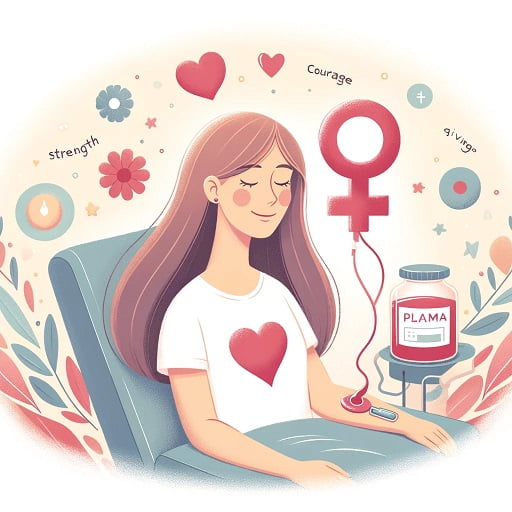Introduction
Contents
- 1 Introduction
- 2 Understanding Plasma Donation: The Liquid Gold
- 3 Can You Donate Plasma on Your Period?
- 4 Conclusion: Give Plasma, Give Life
- 5 Frequently Asked Questions (FAQs)
- 5.1 What are the possible health risks of giving plasma while you are having your period?
- 5.2 Can menstruation impact plasma quality?
- 5.3 Does having a menstrual cycle make me more likely to faint when giving plasma?
- 5.4 Can someone who is experiencing menstruation cramps give plasma?
- 5.5 Can donating plasma delay my period?
- 5.6 Do plasma donation clinics include amenities if I need to manage my period?
- 5.7 How many calories does donating plasma burn?
Greetings, cherished online community. Please join us as we as we answer a question that is both highly significant and strangely taboo: can you donate plasma on your period? You read that correctly. Everything from the crimson tide to Aunt Flo’s visit—call it what you will—and whether or not it gets along with plasma donation is up for discussion. It promises to be an insightful trip, so buckle up.
Understanding Plasma Donation: The Liquid Gold
Plasma, my friend, is the liquid gold of your body that accounts for around 55% of the bloodstream concentration. In addition to removing wastes from blood, plasma carries nutrients, hormones, and proteins to those part of the body where they are needed. During plasma donation, a machine draws blood from your arm, filters out the plasma and stores it, and then gives the remaining blood back to you. Patients suffering from conditions that impact blood coagulation or infection defenses, as well as those who have suffered burns or trauma, can all benefit from plasma therapy. Donating plasma is a tremendous act of compassion since the donor may improve the lives of others as their own body rapidly restocks the plasma.
The Plasma Donation Process: What to Anticipate Before Making a Donation
It’s a simple procedure that just requires a brief health examination, a comfortable chair, a little needle (I swear), and around an hour of your time. If you’re menstruating, just make sure to use your preferred period product beforehand, and you’re golden.
Eligibility for Plasma Donation: The Fine Print
Let’s discuss about who can donate before you put on your superhero cape (or, you know, your sweatpants) and go to the nearest plasma donation facility. Donors must be in excellent health, weigh at least 110 pounds, and often fall between the age range of 18 to 69 to be eligible to donate plasma. Having a menstrual cycle does not, however, rule out plasma donation. Do not allow your cycle to stop you if you are up to it. The true enemy of plasma donation is anemia, therefore as long as your iron levels are enough, you should be fine.

Can You Donate Plasma on Your Period?
Here’s where myths get busted: donating plasma while on your period is totally fine. The donation process doesn’t care if you’re menstruating. What it cares about is your plasma, and last time I checked, periods don’t affect plasma quality. The truth is, being on your period doesn’t affect your ability to donate plasma. Your body, your plasma, and your period coexist in a kind of harmony that science just gives a nod to. Therefore, ignore your cycle if you’re in the mood to go. If your iron levels are sufficient, you should be fine; anemia is the true enemy here.
Can Donating Plasma Affect Your Period?
So, does donating plasma affect your menstrual cycle? Science says, “Nah.” There’s no concrete evidence to suggest donating plasma will turn your menstrual cycle into a rollercoaster. Bodies are resilient; they bounce back faster than you can say, “Where’s my cookie?”
External Factors That Might Affect Period After Plasma Donation
Sometimes, your period might pull a “brb” after donating, but it’s usually not the donation itself causing the delay. Stress, hydration levels, dietary changes—these are the usual suspects. Let’s shine a spotlight on these:
- Stress: Stress can be a master puppeteer of your cycle, potentially delaying or altering it. Donating plasma, while noble, might add an ounce of stress for some, especially first-timers.
- Hydration: Our bodies are like sensitive houseplants that thrive when given water. You should drink plenty of water before and after donating plasma. Falling short on your H2O intake can not only affect your donation experience but can also send ripples through your menstrual cycle.
- Diet and Nutrition: The fuel you choose for your body’s engine matters. Prior to donation, you might tweak your diet – more iron, more fluids. These changes, albeit healthy, can sometimes play a tiny role in the grand scheme of your menstrual rhythm.
- Physical Activity: Whether you’re a marathoner or a yoga enthusiast, your activity levels around the time of donation might need adjusting. Overexertion can lead your cycle to deviate from its norm, seeking a semblance of balance.
- Sleep Patterns: Ever notice how a couple of nights of poor sleep can make you feel off-kilter? Your menstrual cycle notices too. Plasma donation, especially if you’re worried about it, might temporarily throw off your sleep schedule. And when sleep gets erratic, your menstrual cycle might decide to improvise.
- Environmental Changes: Sometimes, it’s not just what’s happening inside us but around us. Your cycle may detect environmental signals and change the timing or intensity of your menstruation based on these factors, such as if you are traveling or if there are major weather changes in the area.
- Caffeine and Alcohol Consumption: Before plasma donation, reducing caffeine and alcohol intake may improve physical health but may also affect the menstruation cycle as it adjusts to a new normal.
- Medications and Supplements: Your menstrual cycle may be affected by some supplements and drugs that you take in order to be ready to donate plasma, such as iron supplements.
- Immune Response: The immune system, a vital body defense mechanism, can sometimes overreact to plasma donation, potentially disrupting hormonal balance and potentially affecting the menstrual cycle.

Tips for Donating Plasma While on Your Period
Alright, warriors, here’s how to navigate the plasma donation process without feeling like you’re auditioning for the role of Lead Zombie in a B-movie.
- Hydrate like you’re crossing the Sahara: Plasma is mostly water, and so are you. Make sure you and your plasma are in perfect condition by consuming lots of water before the donation.
- Eat iron-rich foods: Spinach, red meat, lentils or fortified cereals—think of them as your pre-donation power-up. Before giving plasma while you’re on a period, fuel yourself on iron-rich meals to keep going strong.
- Listen to your body: Your body will tell you if something’s not right, whether it’s during the donation process or afterward. Head spinning? Lightheaded? These are signs to reschedule or take it easy after donating plasma.
- Wear Your Comfiest Dress: Choose your outfit like you’re going to a Netflix binge-fest, not the Met Gala. Put on a dress with short or loose sleeves to keep your arms easily accessible during plasma donation.
- Bring a Buddy or a Book: Slipping into the chair for plasma donation, the minutes can stretch ahead, seemingly endless. But bringing a chat buddy or an engaging book or your favorite music with you can make the time fly by.
- Sanitary supplies and medication: Donating plasma while on you period takes a little preparation. You may have a thing for tampons or menstrual cups, but during plasma donation, you have to remove them, so it’s better you use napkins or pads instead. To deal with your menstrual cramps, it’s absolutely fine to take an over-the-counter pain reliever before donating plasma.
Conclusion: Give Plasma, Give Life
So, there you have it, my benevolent bleeders. Donating plasma while on your period is not only doable, it’s encouraged. You’re not just giving plasma; you’re giving someone a fighting chance, a breath of life, a moment of peace. And that, dear readers, is something worth rolling up your sleeve for, period or not.
Before you dash off to become the plasma hero you were always meant to be, remember: check in with a healthcare professional if you have any concerns. Keep your health as a top priority always.
Frequently Asked Questions (FAQs)
What are the possible health risks of giving plasma while you are having your period?
You may safely give plasma throughout your period without worrying about any negative effects on your health. Just make sure you’re feeling good overall.
Can menstruation impact plasma quality?
There is zero correlation between your menstrual cycle and plasma quality.
Does having a menstrual cycle make me more likely to faint when giving plasma?
While there is no higher danger, it is important to have a healthy meal in before and remain hydrated in order to feel your best.
Can someone who is experiencing menstruation cramps give plasma?
If cramping is causing you discomfort or illness, you may either wait to donate until you’re feeling better or use an over-the-counter pain reliever.
Can donating plasma delay my period?
You will not experience any changes to your menstrual cycle or flow when you donate plasma.
Do plasma donation clinics include amenities if I need to manage my period?
Yes, centers are equipped with restrooms and facilities to ensure your comfort and privacy.
How many calories does donating plasma burn?
During a session of plasma dontation, which takes around 60 to 90 mins, a women burns 650 to 900 calories on average.









One Comment